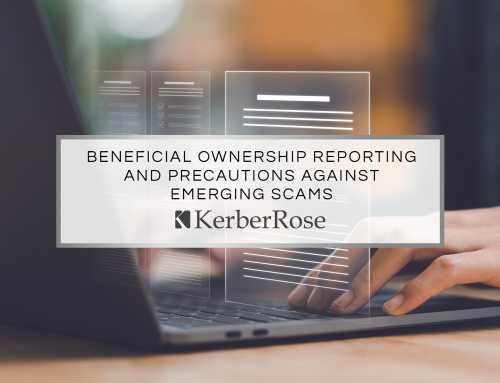How the Inflation Reduction Act Will Benefit Small Businesses
Recently, the Inflation Reduction Act was passed by Congress and signed into law by President Biden. It aims to curb inflation by reducing the federal deficit, lowering prescription drug prices, and promoting domestic energy production and clean energy sources. Given the current political climate, there are a lot of conflicting opinions and misinformation circulating about the act, and whether it will be successful in reducing inflation remains to be seen. However, the law contains some key provisions, which will reduce taxes for many small business owners. Read on for a list of how small businesses can benefit from the Inflation Reduction Act.
Extension of the Limitation on Excess Business Losses
Before the passage of the Inflation Reduction Act, a non-corporate taxpayer could not deduct “excess business losses,” which are trade or business losses that exceed trade or business income by more than $500,000 for married individuals filing jointly, or by more than $250,000 for other non-corporate taxpayers. The excess business loss limitation, or EBL, was set to expire on January 1, 2026. With the passage of the IRA, the excess business loss limitation is now set to expire before January 1, 2029.
Increase in the Research and Development Tax Credit
The IRA doubles the refundable research and development tax credit for small businesses; this raises the annual credit from $250,000 to $500,000. The credit can be applied against payroll taxes and other business expenses, such as technology and product development. Furthermore, the credit can now apply to the Medicare portion of taxes, rather than just the Social Security portion. Taxpayers with more credit than liability are also able to carry forward unused amounts.
Credit for Clean Commercial Vehicles
The Inflation Reduction Act provides a new business tax credit of up to 15% of the cost of certain commercial clean vehicles. This percentage is increased to 30% if the vehicle is not powered by a gasoline or a diesel internal combustion engine.
The credit is subject to a per-vehicle limit of $7,500 for a vehicle weighing less than 14,000 pounds and $40,000 for a larger vehicle. Please reach out to your KerberRose Trusted Advisor, as there are additional requirements regarding this new vehicle credit.
This article is only an overview of the biggest ways the Inflation Reduction Act is positioned to help small businesses. If you have any additional or specific questions about how your small business can benefit from this law’s provisions, contact a KerberRose Trusted Advisor today!
How the Inflation Reduction Act Will Benefit Small Businesses
Recently, the Inflation Reduction Act was passed by Congress and signed into law by President Biden. It aims to curb inflation by reducing the federal deficit, lowering prescription drug prices, and promoting domestic energy production and clean energy sources. Given the current political climate, there are a lot of conflicting opinions and misinformation circulating about the act, and whether it will be successful in reducing inflation remains to be seen. However, the law contains some key provisions, which will reduce taxes for many small business owners. Read on for a list of how small businesses can benefit from the Inflation Reduction Act.
Extension of the Limitation on Excess Business Losses
Before the passage of the Inflation Reduction Act, a non-corporate taxpayer could not deduct “excess business losses,” which are trade or business losses that exceed trade or business income by more than $500,000 for married individuals filing jointly, or by more than $250,000 for other non-corporate taxpayers. The excess business loss limitation, or EBL, was set to expire on January 1, 2026. With the passage of the IRA, the excess business loss limitation is now set to expire before January 1, 2029.
Increase in the Research and Development Tax Credit
The IRA doubles the refundable research and development tax credit for small businesses; this raises the annual credit from $250,000 to $500,000. The credit can be applied against payroll taxes and other business expenses, such as technology and product development. Furthermore, the credit can now apply to the Medicare portion of taxes, rather than just the Social Security portion. Taxpayers with more credit than liability are also able to carry forward unused amounts.
Credit for Clean Commercial Vehicles
The Inflation Reduction Act provides a new business tax credit of up to 15% of the cost of certain commercial clean vehicles. This percentage is increased to 30% if the vehicle is not powered by a gasoline or a diesel internal combustion engine.
The credit is subject to a per-vehicle limit of $7,500 for a vehicle weighing less than 14,000 pounds and $40,000 for a larger vehicle. Please reach out to your KerberRose Trusted Advisor, as there are additional requirements regarding this new vehicle credit.
This article is only an overview of the biggest ways the Inflation Reduction Act is positioned to help small businesses. If you have any additional or specific questions about how your small business can benefit from this law’s provisions, contact a KerberRose Trusted Advisor today!
How the Inflation Reduction Act Will Benefit Small Businesses
Recently, the Inflation Reduction Act was passed by Congress and signed into law by President Biden. It aims to curb inflation by reducing the federal deficit, lowering prescription drug prices, and promoting domestic energy production and clean energy sources. Given the current political climate, there are a lot of conflicting opinions and misinformation circulating about the act, and whether it will be successful in reducing inflation remains to be seen. However, the law contains some key provisions, which will reduce taxes for many small business owners. Read on for a list of how small businesses can benefit from the Inflation Reduction Act.
Extension of the Limitation on Excess Business Losses
Before the passage of the Inflation Reduction Act, a non-corporate taxpayer could not deduct “excess business losses,” which are trade or business losses that exceed trade or business income by more than $500,000 for married individuals filing jointly, or by more than $250,000 for other non-corporate taxpayers. The excess business loss limitation, or EBL, was set to expire on January 1, 2026. With the passage of the IRA, the excess business loss limitation is now set to expire before January 1, 2029.
Increase in the Research and Development Tax Credit
The IRA doubles the refundable research and development tax credit for small businesses; this raises the annual credit from $250,000 to $500,000. The credit can be applied against payroll taxes and other business expenses, such as technology and product development. Furthermore, the credit can now apply to the Medicare portion of taxes, rather than just the Social Security portion. Taxpayers with more credit than liability are also able to carry forward unused amounts.
Credit for Clean Commercial Vehicles
The Inflation Reduction Act provides a new business tax credit of up to 15% of the cost of certain commercial clean vehicles. This percentage is increased to 30% if the vehicle is not powered by a gasoline or a diesel internal combustion engine.
The credit is subject to a per-vehicle limit of $7,500 for a vehicle weighing less than 14,000 pounds and $40,000 for a larger vehicle. Please reach out to your KerberRose Trusted Advisor, as there are additional requirements regarding this new vehicle credit.
This article is only an overview of the biggest ways the Inflation Reduction Act is positioned to help small businesses. If you have any additional or specific questions about how your small business can benefit from this law’s provisions, contact a KerberRose Trusted Advisor today!




